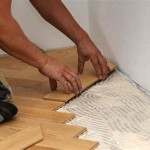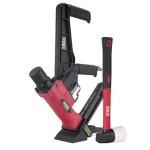What Kind of Nails for Face Nailing Hardwood Floors in a Basement?
Face nailing hardwood floors is a common technique used to secure planks to the subfloor, providing a solid and durable installation. While this method is suitable for various flooring applications, face nailing in a basement presents unique challenges. The high humidity and moisture levels can affect the wood's stability and necessitate specific considerations for nail selection. This article will explore the essential factors to consider when choosing nails for face nailing hardwood floors in a basement, aiming to guide homeowners and flooring professionals in making informed decisions.
Understanding the Demands of Basement Installations
Basements are susceptible to moisture issues, which can significantly impact the longevity and performance of hardwood floors. Moisture can cause wood to warp, cup, or shrink, leading to uneven surfaces and potential floor movement. Additionally, the lower temperatures in basements can further influence the wood's behavior. Therefore, choosing nails that can withstand these conditions is crucial for a successful installation.
The ideal nails for face nailing hardwood floors in a basement should possess the following qualities:
- Corrosion Resistance: Basement environments often contain moisture, which can accelerate nail rusting. Stainless steel, galvanized, or copper nails are generally preferred for their resistance to corrosion, ensuring long-term durability.
- Holding Power: The nails need to hold the floorboards securely to the subfloor, preventing movement or loosening over time. Choosing nails with a larger diameter or a specialized ring shank can enhance holding power, especially in moisture-prone areas.
- Flexibility: Wood can expand and contract with changes in temperature and humidity. Nails that offer a degree of flexibility can accommodate these movements, reducing stress on the floorboards and minimizing the risk of cracking or splitting.
Nail Types and Considerations
Several nail types are commonly used for face nailing hardwood floors. The most suitable option depends on the specific flooring materials, subfloor type, and desired finish. Let's examine some popular choices and their advantages and disadvantages:
1. Cleated Nails
Cleated nails, sometimes called "finish nails," feature a small, flat head and a sharp point. They are widely used for face nailing, as they provide a secure hold and do not protrude significantly above the hardwood surface. This makes them suitable for both solid and engineered hardwood flooring.
Advantages:
- Relatively affordable
- Provide a strong grip
- Can be easily countersunk and hidden with wood filler
Disadvantages:
- May require pre-drilling for hardwoods with high density
- Potentially vulnerable to bending if the wood is too hard or the nail is driven in at an angle
- May require specialized tools for countersinking
2. Ring Shank Nails
Ring shank nails have a series of rings along their shaft, increasing their holding power. The rings create friction against the wood, preventing the nail from pulling out. These nails are a popular choice for hardwood flooring, especially in high-traffic areas or where greater strength is required.
Advantages:
- Excellent holding power
- Reduce the risk of nail pops
- Ideal for hardwoods that tend to expand and contract significantly
Disadvantages:
- More expensive than cleated nails
- May require specialized nailing tools with a wider head
- May be harder to countersink due to their larger diameter
3. Brad Nails
Brad nails are thin and short nails with a small head. They are frequently used for finishing work and can be ideal for attaching hardwood flooring to plywood subfloors. Brad nails are often used in conjunction with a pneumatic nailer, which provides consistent nail penetration and eliminates the need for pre-drilling.
Advantages:
- Minimally invasive, leaving small holes for easy filling
- Quick and efficient installation with pneumatic nailers
- Suitable for thin hardwood flooring applications
Disadvantages:
- May not provide enough holding power for high traffic areas or thicker hardwood flooring
- Not suitable for all subfloor types (e.g., concrete)
- Require a specialized nailer for proper installation
Choosing the Right Nails for Your Basement
When selecting nails for face nailing hardwood floors in a basement, consider the following factors:
- Wood Species: Hardwoods like oak, cherry, and maple require stronger nails than softer woods like pine or maple.
- Subfloor Type: The subfloor material influences the nail choice. Plywood subfloors generally require different nails than concrete subfloors.
- Floor Thickness: Thicker hardwood planks may require longer nails to secure them to the subfloor.
- Installation Method: Hand nailing or pneumatic nailing will dictate the nail's length and head size.
- Climate: Consider the basement's humidity levels and temperature fluctuations when choosing corrosion-resistant nails.
It is always advisable to consult with a qualified flooring professional for expert advice on the most suitable nails for your specific project. They can assess the conditions, materials, and installation requirements to recommend the appropriate nails and techniques, ensuring a successful and durable hardwood floor installation in your basement.

Installing Hardwood Floors On A Budget Dumpster

Floating Floor Vs Nail Down Slaughterbeck Floors Inc

Floating Floor Vs Nail Down Slaughterbeck Floors Inc

How To Re Install Face Nailed Oak Flooring
The Elegance Of Hardwood Is Unparalleled As A Flooring Choice However If It S Not Installed Correctly Floor Squeaks Shrinkage Or Buckling Can Ruin Job Jlc

How To Nail Down Hardwood Flooring Builddirect

Finishing Moves Repairing Hardwood Floors Extreme How To
:strip_icc()/101206837-1dd14e2eaebe404e9c0e3fd1494b7c77.jpg?strip=all)
How To Install Hardwood Floors

Install Faq The Hardwood Flooring Experts Petes Floors

Face Nailed Top How Do I Remove Doityourself Com Community Forums
Related Posts








